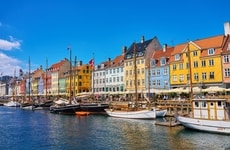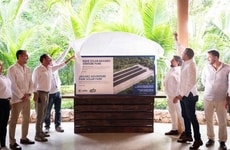30 Eco-Friendly Travel Innovations
From Hotel Vintage Markets to Sustainable Tourism Initiatives
Jana Pijak — May 23, 2025



Today’s travelers are more conscious than ever, seeking experiences that align with their values as much as their bucket lists. As awareness of climate change and environmental impact grows, so does the demand for more sustainable ways to explore the world. Consumers are prioritizing eco-friendly accommodations, low-emission transportation, and tourism that gives back to local communities. It’s no longer just about where we go—it’s about how we get there, what we leave behind, and how we contribute along the way. This shift in mindset is driving a wave of innovation across the travel industry, transforming everything from hotels to holiday souvenirs into opportunities for sustainability.
In the air travel space, airlines are adopting eco-friendly airline utensils, replacing plastic with compostable or reusable materials, while sustainable airplane amenities like bamboo toothbrushes and refillable toiletry kits are reducing onboard waste. Some airlines are pushing even further with dynamic hybrid-electric planes, aiming to drastically cut carbon emissions in short-haul flights.
Hotels are also evolving, with sustainable net zero hotels gaining attention for their low impact operation models, thanks to the use of solar panels, smart systems, and recycled materials. Additionally, playful sustainable hotels are blending whimsy with low-impact design, offering travelers both fun and functionality. Certified sustainable wellbeing centres are also gaining attention by integrating holistic health with environmental responsibility, often sourcing local, organic products. In regions like Oceania and Asia in particular, eco-friendly hotels are prioritizing rainwater collection, native landscaping, and community partnerships. Efforts like hotel-led vintage markets and sustainable hotel partnerships are other initiatives that help local economies while promoting circularity within the hospitality space.
Overall, tourism is evolving to meet growing environmental and cultural awareness, with eco-conscious efforts promoting low-impact itineraries that prioritize local respect and resource conservation. Destinations are embracing sustainable tourism models focused on long-term environmental and economic resilience, from African safaris that support conservation to retreats housed in restored heritage buildings. Initiatives like sustainable mountain climbing fees in Nepal help maintain natural sites, while educational eco-tourism programs deepen traveler awareness through meaningful, place-based engagement.
This shift is also influencing traveler behavior through incentives such as discounts for choosing green-certified accommodations or traveling during off-peak times. Infrastructure is adapting too, with remote rest stops integrating composting toilets and solar power, and major events like Mardi Gras and music tours rethinking logistics to reduce single-use plastics and emissions
.
Transportation is undergoing a similar transformation. Hybrid-electric train fleets and urban eco transport systems, including electric shuttles and e-bikes, are making movement cleaner and more efficient. Even immersive nature escapes are being designed to foster connection without environmental compromise.
Collectively, these efforts reflect a future where travel not only leaves a lighter footprint but enriches both travelers and destinations alike.















































